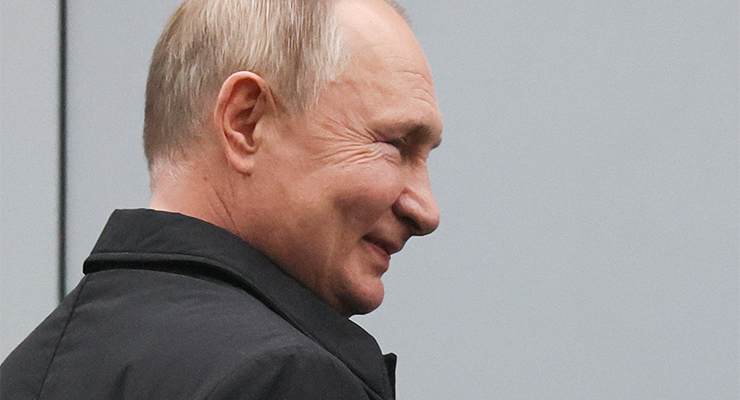
“Give diplomacy a chance.” This phrase gets repeated in almost every conflict, and the war in Ukraine is no exception. A chorus of commentators, experts and former policymakers have pushed for a negotiated peace at every turn on the battlefield: after the successful defence of Kyiv, once Russia withdrew to the east, during the summer of Russia’s plodding progress in the Donbas, after Russia’s rout in Kharkiv oblast, and now, in the aftermath of Russia’s retreat from Kherson. The better the Ukrainian military has done, the louder the calls for Ukraine to negotiate have become.
And today, it’s no longer just pundits pushing for a negotiated settlement. The US House of Representatives’ progressive caucus penned a letter to President Joe Biden calling for a diplomatic solution, only to retract it a short time later. Republican House Leader Kevin McCarthy has promised to scrutinise military aid to Ukraine and push for an end to the war. Even Joint Chiefs of Staff chairman Mark Milley has reportedly pushed for Ukraine to negotiate, although he subsequently made clear that the decision should be Kyiv’s alone.
And why not negotiate? Isn’t a diplomatic solution the best — indeed, the only — option for any kind of long-term settlement between Russia and Ukraine? And if so, what could possibly be the harm in exploring those options? Quite a lot, actually: despite the way it is commonly portrayed, diplomacy is not intrinsically and always good, nor is it cost-free. In the Ukraine conflict, the problems with a push for diplomacy are especially apparent. The likely benefits of negotiations are minimal, and the prospective costs could be significant.
First, the argument that most wars end with diplomacy and therefore so will the war in Ukraine is misleading at best. Some wars — such as the US Civil War and World War II — were fought to the bitter end. Others — like the American Revolution, the Spanish-American War, World War I, or the First Gulf War — were won on the battlefield before the sides headed to the negotiating table. Still others — like the Korean War — ended in an armistice, but only after the sides had fought to a standstill. By contrast, attempts at a diplomatic settlement while the military situation remained fluid — as the United States tried during the Vietnam War and, more recently, in Afghanistan — have ended in disaster. Even if most wars ultimately end in diplomatic settlements, that’s not in lieu of victory.
At this particular moment, diplomacy cannot end the war in Ukraine, simply because Russian and Ukrainian interests do not yet overlap. The Ukrainians, understandably, want their country back. They want reparations for the damage Russia has done and accountability for Russian war crimes. Russia, by contrast, has made it clear that it still intends to bend Ukraine to its will. It has officially annexed several regions in eastern and southern Ukraine, so withdrawing would now be tantamount, for them, to ceding parts of Russia. Russia’s economy is in ruins, so it cannot pay reparations. And full accountability for Russian war crimes may lead to Russian President Vladimir Putin and other top officials getting led to the dock. As much as Western observers might wish otherwise, such contrasts offer no viable diplomatic way forward right now.
Nor is diplomacy likely to forestall future escalation. One of the more common refrains as to why the United States should give diplomacy a chance is to avert Russia making good on its threats to use nuclear weapons. But what is causing Russia to threaten nuclear use in the first place? Presumably, it is because Russia is losing on the battlefield and lacks other options. Assuming that “diplomatic solution” is not a euphemism for Ukrainian capitulation, as its proponents insist, Russia’s calculations about whether and how to escalate would not change. Russia would still be losing the war and looking for a way to reverse its fortunes.
Diplomacy can moderate human suffering, but only on the margins. Throughout the conflict, Ukraine and Russia have negotiated prisoner swaps and a deal to allow grain exports. This kind of tactical diplomacy on a narrow issue was certainly welcome news for the captured troops and those parts of the world that depend on Ukrainian food exports. But it’s not at all clear how to ramp up from these relatively small diplomatic victories. Russia, for example, won’t abandon its attacks on Ukrainian infrastructure heading into the winter as it attempts to freeze Ukraine into submission, because that’s one of the few tactics Russia has left.
At the same time, more expansive diplomacy comes at a cost. Pushing Ukraine to negotiate now sends a series of signals, none of them good: it signals to the Russians that they can simply wait out Ukraine’s Western supporters, thereby protracting the conflict; it signals to the Ukrainians — not to mention other allies and partners around the world — that the United States might put up a good fight for a while but will, in the end, abandon them; and it tells the US public that its leaders are not invested in seeing this war through, which in turn could increase domestic impatience with it.
Starting negotiations prematurely carries other costs. As Biden remarked in June: “Every negotiation reflects the facts on the ground.” Biden is right. Ukraine now is in a stronger negotiating position because it fought rather than talked. The question today is whether Ukraine will ultimately regain control over Donbas and Crimea, not Kharkiv and Kherson. This would not have been the case had anyone listened to the “give diplomacy a chance” crowd back in the spring or summer.
There are plenty of reasons to believe that Kyiv will be in an even stronger bargaining position as time passes. The Ukrainians are coming off a string of successes — most recently retaking Kherson — so they have operational momentum. While Ukraine has suffered losses, Western military aid continues to flow in. Despite Russia’s missile strikes on civilian infrastructure, Ukrainian morale remains strong. By contrast, Russia is on the back foot. Its military inventories have been decimated, and it is struggling to acquire alternative supplies. Its mobilisation effort prompted as many Russian men to flee the country as were eventually mobilised to fight in Ukraine. Moreover, as the Institute for the Study of War has assessed, “Russian mobilised servicemen have shown themselves to be inadequately trained, poorly equipped, and very reluctant to fight.”
By contrast, a negotiated settlement — even if it successfully freezes a conflict — comes with a host of moral, operational, and strategic risks. It leaves millions of Ukrainians to suffer under Russian occupation. It gives the Russian military a chance to rebuild, retrain, and restart the war at a later date. Above all, a pause gives time for the diverse international coalition supporting Ukraine to fracture, either on its own accord or because of Russian efforts to drive a wedge into the coalition.
Eventually, there will come a time for negotiations. That will be when Russia admits it has lost and wants to end the war. Or it will come when Ukraine says that the restoration of its territory isn’t worth the continued pain of the Russian bombardment. So far, neither scenario has come to pass. Indeed, the only softening of Russia’s position was Putin’s statement last month seemingly ruling out nuclear use — at least for the time being. Apart from that, the Kremlin seems intent on doubling down, even as its military continues to be slowly pushed out of Ukraine. That’s hardly an invitation to negotiate.
Might these arguments against the reflexive call for negotiations mean that war continues for months and possibly even years? Perhaps. But it’s not yet clear that there is a viable diplomatic alternative. And even if there was, it should be Ukraine’s choice whether or not to pursue it. Ukraine and its people, after all, are paying the price in blood. If the United States and its allies are sending tens of billions of dollars in military and economic aid to Ukraine, this is only a tiny fraction of what Washington has recently spent on defence and other wars. Thanks to the Ukrainians’ excellent use of this aid, the military threat from the United States’ second-most important adversary has been dealt a serious blow. The cold, if cruel, reality is that the West’s return on its investment in Ukraine seems high.
The harshness of these realities, however, does not make current calls for a negotiated settlement intrinsically moral. If diplomacy means ramming through a settlement when the battlefield circumstances dictate otherwise, it is not necessarily the morally more justifiable or strategically wiser approach. Sometimes fighting — not talking — is indeed the better option.
“To everything there is a season,” Ecclesiastes says, including “a time of war, and a time of peace”. There will come a time for diplomacy in Ukraine. Hopefully, it will come soon. But it doesn’t seem to be today.
Is diplomacy the path forward in Ukraine? Let us know by writing to letters@crikey.com.au. Please include your full name to be considered for publication. We reserve the right to edit for length and clarity.










True. Yet there is an important lesson in the differences after those wars ended. The allies in World War II decided half way through the war that their objective was the unconditional surrender of the enemy. No negotiated truce or peace. The war-time governments of both Germany and Japan were replaced and comprehensive constitutional political reforms imposed, fairly successfully as far as anyone can tell, despite all the complications of Germany being partitioned for decades and so on. In contrast, after the US Civil War the attempt at Reconstruction was ended, because of a lack of political will, while the job was far from complete, so the secessionist forces revived and rebuilt their power. The consequences of that failure have been dire and continue to blight the USA to this day. The current insurrection headed by the Republicans is in a large part the legacy of the Confederate secession evolving and erupting again. Even after seeing such a war through to the bitter end the job is not yet done.
The Middle East is inspirational. </sarc>
The Rand Corporation was started by the Douglas Aircraft corporation – part of the US industrial/military complex which Eisenhower warned against.
The RAND CORPORATION, US government war mongering think tank that has been working for a long time to destabilise Russia so as to expand US hegemony into Central Asia and also willingly helped create this current mess in Ukraine.
https://www.rand.org/pubs/research_briefs/RB10014.html
And hence there will be no negotiated settlement, because that wouldn’t suit the US’s ‘rules-based order’ (ie. the US’s geopolitical interests).
Yes, it always pays to note who’s writing the article. Maybe tomorrow, in the interests of balance, Crikey could publish something from the Kremlin.
What has Crikey become? Now printing foreign propaganda.
In the interest of Balance.
It is pointless just publishing blatant Western Propaganda without also providing the other sides viewpoint.
Like the media strategy used to create confusion around climate or covid science? Like how US fossil fueled Koch linked think tanks would also agree with you?
You apparently think that the moral thing is to fight to “the last Ukrainian”. Yes, very moral! It would be a good idea for the writers of this article to check out media from the Russian side also. The Ukrainians did not win a battle in either Kharkov or Kherson, on both occasions the Russians did a strategic withdrawal, which some Western media acknowledged. Russia is about to get serious and then there will be no opportunity for diplomacy. I know I will be accused of being a “Putin puppet” but I would just like people to stop killing each other over differences which could be solved diplomatically before Europe is forced to take millions of Ukrainian refugees which would create even more chaos in Europe and/or NATO involvement leads WWIII. It is madness!
Well said Judith W.
It is very sad that lately Crikey seems to have been caught up in the loop of Western Propaganda.
You have access to verified and credible sources for your claims, that other don’t?
There will be no negotiated end. Putin for one doesnt want the war to end. He would be happy for peace negotiations but only to string out the time so he can rebuild. Putin cant afford for the war to end because then there would be a reconning. What did Russia get for the 60,000 or so dead and about the same of disabled soldiers? Putin wont want to answer that question so in the absence of victory he needs to keep the war going. If there is a reconning Putin is in deep trouble at home most likely fatal.
Any successor to Putin is likely to be better organised and stronger.
A Russian De Santis?